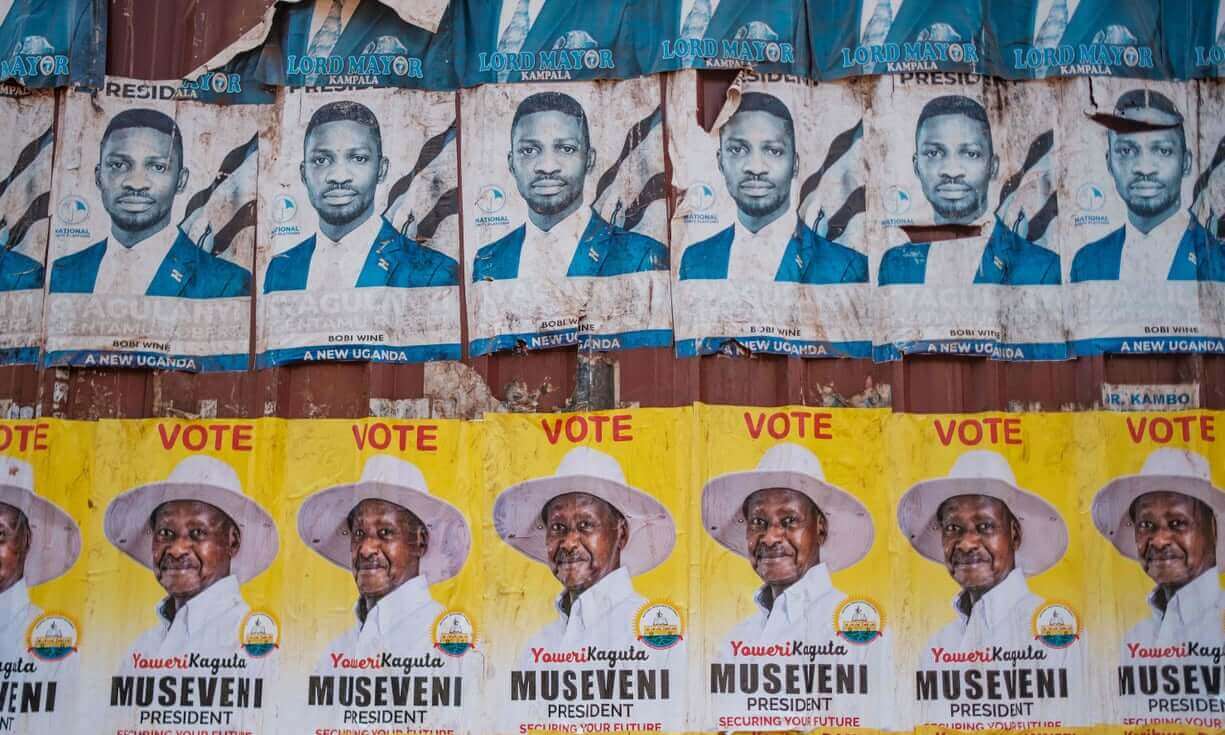Later this week, on January 14, more than 18 million Ugandans will take to the polls to cast their ballots in the country’s presidential and parliamentary elections. The run-up to the vote has been intensely scrutinised by both locals and international actors, with many denouncing the intimidation of the opposition, the silencing of the press, and the continued assault on democratic rights by President Yoweri Museveni, who has been in power since 1986.
Opposition politician Bobi Wine is Museveni’s closest challenger, and has already been arrested thrice since announcing his candidacy in November. Just last week, Wine flew his wife and children to the United States after receiving reports of a possible kidnapping attempt. His campaign has routinely been interrupted, either through physical attacks by security forces, mass arrests of his team or his supporters, or arbitrary restrictions on where he can hold rallies. Last week, Wine revealed that he has already replaced his entire campaign team at least twice, saying, “I wake up with people and by the end of the day they are in prison, hospital, or dead.” On January 7, 23 out of 25 member from his campaign were arrested, following a virtually identical incident on December 31.
Wine, for his part, has called on countries like the United States (US) to place sanctions on the Museveni regime or “stop cooperating with Uganda” until Museveni brings an end to human rights abuses in the country. He has also filed a complaint against President Museveni with the International Criminal Court (ICC), citing “systemic violations of international law through a “history of torture and physical abuse” that spans over three decades, including the brutal torture and killing of political activists and political opposition.
Aside from Wine, another opposition candidate, Patrick Amuriat of the Forum for Democratic Change (FDC), has also faced severe political intimidation. Amuriat was arrested on Sunday, allegedly over a traffic violation, representing the ninth time he has been arrested.
In addition, the Ugandan government has revoked the press credentials of all foreign journalists, with the country’s Media Council saying that this measure is to “ensure the industry is well-monitored and sanitized from quacks”. Local journalists, too, have been attacked by security forces. Aside from physical attacks, the ruling government has increased the roadblocks for content-sharing and news platforms to publish information by making it more difficult to obtain authorization and permits from the Uganda Communications Commission (UCC). All of this has contributed to Uganda ranking 125th out of 180 countries in the world press freedom index.
Likewise, political activists and civilians have also borne the brunt of the Museveni administration. In November, following Wine’s decision to announce his candidacy, 54 people were killed and over 800 were arrested.
The army and militarised police are already heavily patrolling cities and towns across the country, and the opposition worries that the deployment of armed forces is aimed at intimidating voters and opposition supporters in order to “suppress voter turnout and enable vote-rigging”. Wine alleges that there are also reports of election officials being “bribed to change results of facilitate multiple voting”.
Against this backdrop, Amuriat’s FDC and Wine’s National Unity Platform (NUP), the two main opposition parties, have said that they will conduct their own independent vote counting operations, although it is not clear how they can achieve this.
The United Nations’ (UN) Office of the High Commissioner for Human Rights (OHCHR) released a statement saying that it is “deeply concerned by the deteriorating human rights situation in Uganda”, with spokesperson Ravina Shamdasani saying that this severely impedes the possibility of there being free and fair elections.
Facebook, for its part, has shut down a number of accounts belonging to Ugandan government officials. The company’s head of communication for sub-Saharan Africa, Kezia Anim-Addo, said, “This month, we removed a network of accounts and pages in Uganda that engaged in CIB (Coordinated Inauthentic Behaviour) to target public debate ahead of the election.” She added, “They used fake and duplicate accounts to manage pages, comment on other people's content, impersonate users, re-share posts in groups to make them appear more popular that they were.”
These measures have drawn severe criticism from the ruling government, with Museveni’s senior press secretary, Don Wanyama, tweeting, “Shame on the foreign forces that think they can aid and plant a puppet leadership on Uganda by disabling online accounts of (ruling party) NRM supporters.”
President Museveni has been in power since 1986. The incumbent leader amended laws to do away with the two-term limit in 2005, after not holding any elections for the first ten years of his rule. Then, in 2017, he removed the age limit for presidential candidates to allow him to seek re-election as the National Resistance Movement’s (NRM) candidate once more.
Aside from his political corruption, Museveni has also failed to deliver on his economic promises. He put forth the National Development Plan, to focus on Uganda’s agriculture, tourism, and minerals industries, with a goal of becoming a lower-middle-income country by 2020 and an upper-middle income country by 2040. However, with an annual GNI per capita of just $780, Uganda has fallen well short of this goal, with the minimum GNI per capita required to be classified as a lower-middle-income country standing at between $1,036 and $4,045.
Against this widespread popular discontent, it seems as though opposition candidates stand a good chance of finally unseating the long-term leader. However, given Museveni’s control over all arms of the government and the security forces, this is easier said than done. Unfortunately, whatever the results are from Thursday’s election, there is expected to be an escalation in violence and instability in an already volatile country.
Uganda Prepares for Election as President Museveni Orders Armed Forces to Tighten Control
President Yoweri Museveni has continued to bulldoze press and political freedoms and intimidate the opposition ahead of Uganda’s presidential and parliamentary elections on January 14.
January 12, 2021

SOURCE: SUMY SADURNI / AFP / GETTY IMAGES
